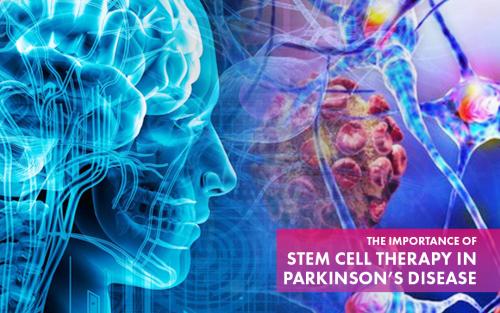The Importance of Stem Cells Therapy For Parkinson’s Disease

Parkinson's disease (PD) is a highly prevalent neurodegenerative disorder that is characterised by the precise, progressive loss of dopaminergic (DA) neurons in the brain, resulting in motor neuron damage, tremors, and loss of balance. Non-motor disease symptoms of Parkinson's disease include rapid eye movement, sleep disorders, depression, and bowel problems. Evidently, no restorative therapies are presently available to alter or restore the progression of the intrinsic disease processes.
Available Treatments for PD
The existing gold standard for Parkinson's disease treatment is the intake of levodopa, which has consistently demonstrated satisfactory outcomes in the temporal restoration of PD symptoms. Long-term exposure to levodopa, on the other hand, leads to a progressive reduction in drug effectiveness and cognitive and psychiatric problems.
Conversely, surgical methods like deep brain stimulation (DBS) have been shown to mitigate PD motor symptoms and facilitate symptomatic relief that medicines cannot handle. Nevertheless, its use is not only restricted to early-to-mid-stage Parkinson's disease, but it also ends up losing efficacy after several years.
Alternative Approach- Stem Cell Therapy
In the past few decades, cell-based therapy employing human stem cells has made huge progress in conquering the aforementioned limitations in Parkinson's disease treatment. Stem cell therapy is considered to replace inflamed, dysfunctional tissues in the anticipation of restoring lost motor neuron function induced by degeneration of neurons. Mesenchymal Stem Cells in particular are known to have great potential as a successful treatment for neurodegenerative diseases.
Since a large number of motor deficits are heavily related to a single cell-the dopamine neuron-disease Parkinson's is a suitable choice for stem cell therapy. Stem cells have an unparalleled regenerative capacity and can also naturally produce a wide range of support factors. This represents a significant advancement in acknowledging how stem cells can influence future Parkinson's treatments. Researchers hope to use stem cells to treat Parkinson's disease in two distinct ways: as manufacturing units to mass-produce dopamine neurons or as an origin of key factors to protect nerve cells.
Human embryonic stem cells (ESCs) and human-induced pluripotent stem cells (hiPSCs) have both been demonstrated in various studies to be capable of developing dopamine-producing neurons. Neurons derived from human stem cells can grow into human dopamine-producing neurons after transplantation.
Advantages of Cell-based therapies for PD
Cell-based therapy has become readily accessible to Parkinson's disease patients. A number of clinical investigations have demonstrated the efficacy of various stem cell therapies. This method reduced the amount of anti-PD medication required. Furthermore, they optimise the motor symptoms of Parkinson's disease. Some of the clinical applications of stem cell therapy for PD include:
They have the potential to regenerate the dysfunctional dopaminergic neurons in the brain
Have the tendency to reduce immune reactions in the body
They have been shown to survive transplantation as well as produce some levels of functional recovery
Stem cells have no adverse effects as compared to medications
Improved motor function post-stem cell therapy
Long-term effectiveness for non-motor symptoms and motor symptoms as well
Cell-based therapies have demonstrated the formation of necessary neuronal circuitry in the brain
Future Management of PD with stem cells
While there are numerous challenges associated with stem cell-based treatments for Parkinson's disease, it appears likely that these treatments will reach the clinic in the near- to medium-term future. Whereas the development of optimised products has to be slow and incremental, the field is now wondering how these therapies can be ramped and received illustrating the accomplishments with these approaches.
As previously stated, the primary goal of stem cell treatments is to control the motor symptoms of Parkinson's disease. While these strategies may frame one arm of future Parkinson's disease treatment, they could almost certainly be merged with other novel treatments targeting immunotherapies and repurposed drugs. Stem cell-based regenerative therapies may be capable of restoring the activity of dopaminergic neurons that have already died, while novel disease-modifying drugs may be possible to deter continuing neuronal death. While no disease-modifying treatments are currently being investigated, stem cell transplantation has the prospect to be at the leading edge of such PD treatments in the future.
Post Your Ad Here
Comments